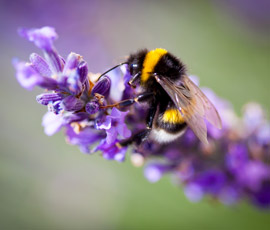Poor weather blamed for record honey bee losses

A third of all honeybee colonies were lost over the winter in England following the wettest summer in 100 years, a new survey shows.
On average 33.8 colonies in every 100 were lost compared with 16.2 in the previous winter – more than double the amount of losses.
In the South West more than half of bee colonies were wiped out (52.9%) and northern regions lost 46.4% of theirs.
The decline of bees follows the EU’s decision earlier this year to ban three neonicotinoid pesticides linked to harming bee health.
Syngenta, which manufactures thiamethoxam, one of the banned chemicals, said the survey showed poor weather and habitats were the main culprit for declining bee health and not agrichemicals.
The BBKA blamed the losses on the continuing poor and changeable weather last year, exacerbated by the late arrival of spring.
The bad weather meant bees were unable to get out and forage, preventing them from gathering pollen and nectar throughout the season.
Virgin queens were unable to mate properly leading them to become drone laying queens, causing those colonies affected to die out, the BBKA said.
The association fears the situation could have worsened since the survey closed at the end of March given the ongoing poor weather.
David Aston, chairman of the BBKA, said: “The training and education of beekeepers to be able to adapt their beekeeping practices to help their honeybees cope with this period of changing weather patterns is a high priority for all beekeeping associations.”
A Syngenta spokesman said: “The BBKA survey is worrying reading for all of us given the vital role which bees play in our lives. It’s clear one of the main causes for their decline is loss of food.
“This finding underlines the importance of projects like our own Operation Pollinator, which for 10 years has being putting food back into the British farm landscape through the establishment of pollen and nectar-rich field margins to help bees.
“We believe industry, government and NGOs should now work together to scale up projects like Operation Pollinator to come to the aid of bees.”
